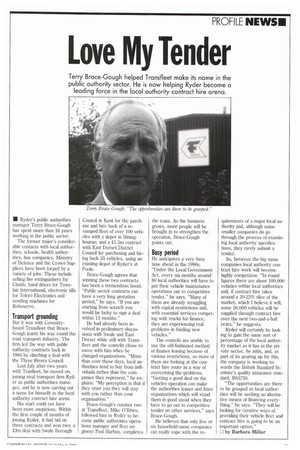Love My Tender
Page 23

If you've noticed an error in this article please click here to report it so we can fix it.
Terry Brace-Gough helped Transfleet make its name in the public authority sector. He is now helping Ryder become a leading force in the local authority contract hire arena.
• Ryder's public authorities manager Terry Brace-Gough has spent more than 16 years working in the public sector.
The former major's considerable contacts with local authorities, schools, health authorities, bus companies, Ministry of Defence and the Crown Suppliers have been forged by a variety of jobs. These include selling fire extinguishers for Chubb, hand driers for Towelair International, electronic tills for Tokyo Electronics and vending machines for Rohoserve.
Transport sounding
But it was with Coventrybased Transfleet that BraceGough learnt his way round the road transport industry. The firm led the way with public authority contracts back in 1984 by clinching a deal with the Three Rivers Council.
Last July after two years with Tranfleet, he moved on, joining rival transport firm Ryder as public authorities manager, and he is now carving out a name for himselft in the local authority contract hire arena.
His start could not have been more auspicious. Within the first couple of months of joining Ryder, it had bid on three contracts and won two; a Om deal with Swale Borough Council in Kent for the purchase and hire back of a revamped fleet of over 100 vehicles with a depot in Sittingbourne; and a 21.5m contract with East Dorset District Council for purchasing and hiring back 35 vehicles, using an existing depot of Ryder's at Poole.
Brace-Gough agrees that winning these two contracts has been a tremendous boost. "Public sector contracts can have a very long gestation period," he says. "If you are starting from scratch you would be lucky to sign a deal within 13 months."
He had already been involved in preliminary discussions with Swale and East Dorset while still with Transfleet and the councils chose to move with him when he changed organisations. "More than ever these days, local authorities tend to buy from individuals rather than the companies they represent," he explains: "My perception is that if they trust you they will stay with you rather than your organisation."
Brace-Gough's number two at Transfleet, Mike O'Brien, followed him to Ryder to become public authorities operations manager and fleet engineer Paul Harbun, completes the team. As the business grows, more people will be brought in to strengthen the operation, Brace-Gough points out.
Busy period
He anticipates a very busy time ahead in the 1990s. "Under the Local Government Act, every six months around 80 local authorities will have to put their vehicle maintenance operations out to competitive tender," he says. "Many of them are already struggling with capital restrictions and, with essential services competing with trucks for finance, they are experiencing real problems in funding new vehicles."
The councils are unable to use the old-fashioned method of finance leasing because of various restrictions, so more of them are looking at the contract hire route as a way of overcoming the problems. "Getting a good deal on the vehicles operation can make the authorities leaner and fitter organisations which will stand them in good stead when they have to go out to competitive tender on other services," says Brace-Gough.
He believes that only five or six household-name companies can really cope with the re quirements of a major local authority and, although some smaller companies do go through the process of examining local authority specifications, they rarely submit a tender.
So, between the big name companies local authority contract hire work will become highly competitive. "In round figures there are about 100,000 vehicles within local authorities and, if contract hire takes around a 20-22% slice of the market, which I believe it will, some 20,000 vehicles will be supplied through contract hire over the next two-and-a-half years," he suggests.
Ryder will certainly be looking to gain the same sort of percentage of the local authority market as it has in the private sector, he adds, and, as part of its gearing up for this, the company is working towards the British Standard Institute's quality assurance standard, BS5750.
"The opportunities are there to be grasped as local authorities will be seeking an alternative means of financing everything," he says. "They will be looking for creative ways of providing their vehicle fleet and contract hire is going to be an important option."
0 by Barbara Millar








































































































